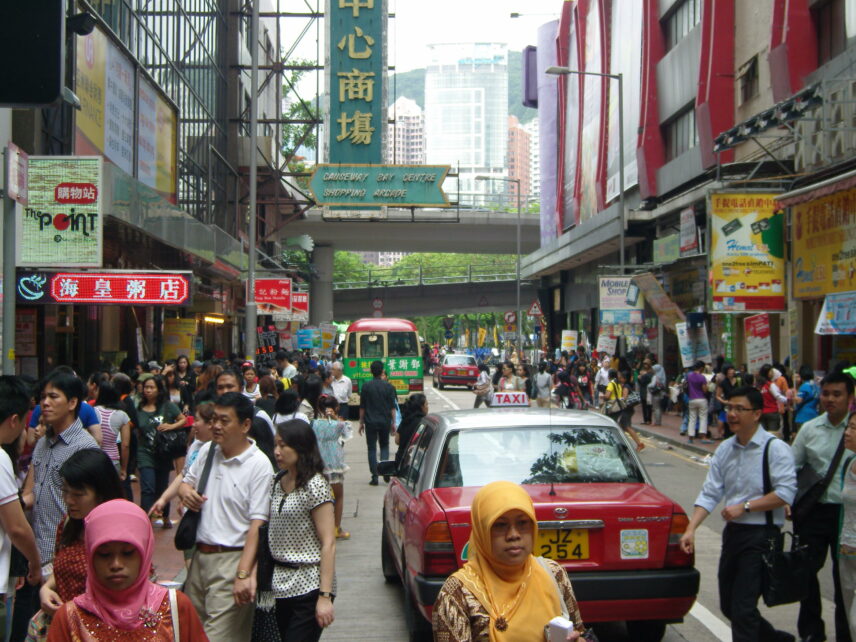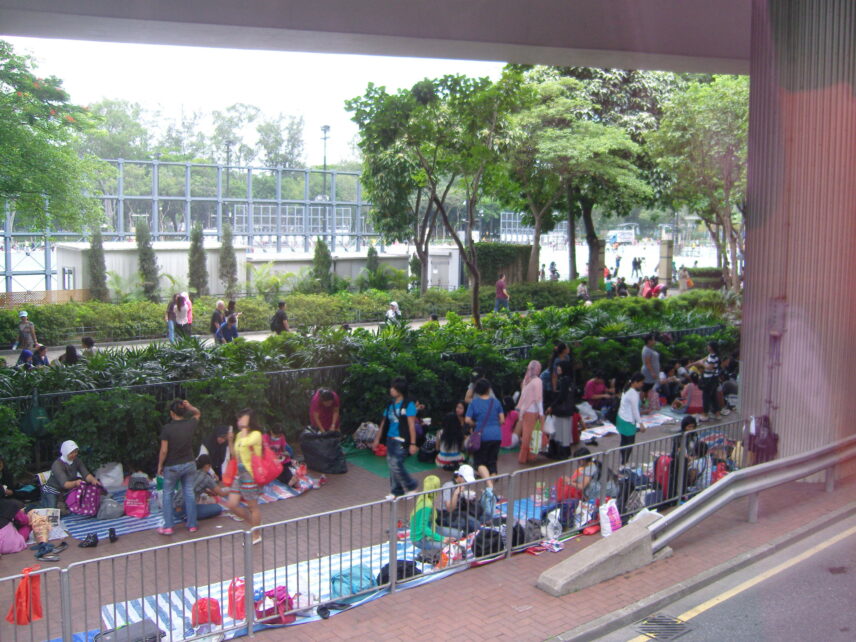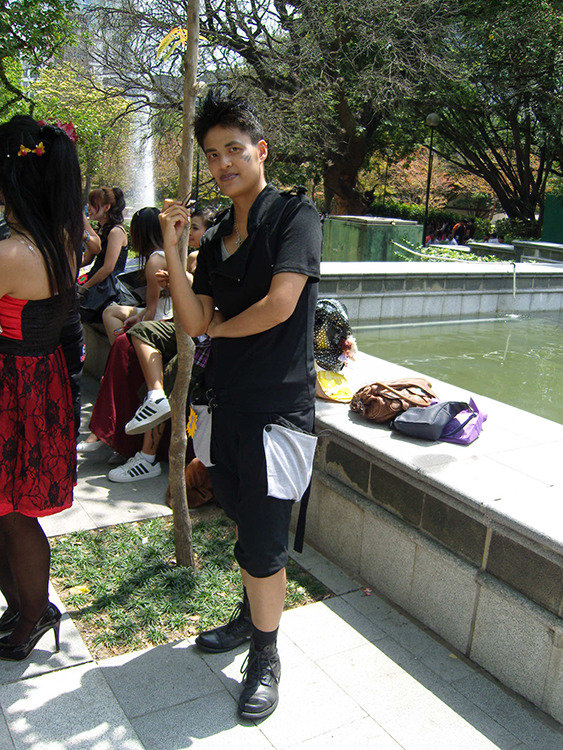Article begins
Hong Kong, a city of seven million people, is a temporary home for more than 300,000 migrant domestic workers who wash, clean, cook, and care for families in the metropolis. About half of them are Indonesian women, mostly from the island of Java, who have come to Hong Kong in search of higher wages (the monthly minimum wage of a foreign domestic worker in Hong Kong is approximately USD 600 (HKD 4,730) while the monthly minimum wage in the provinces of Java is approximately USD 120). The money they earn from several years working in Hong Kong will enable them to build new houses and acquire farmlands back home in Indonesia.
For some domestic workers, migration is not only an opportunity for making money but for seeing a new world and learning a different set of norms. For some, migration opens possibilities for the expression of same-sex desires. Their desires are not necessarily discovered before migration and pursued through the act of leaving home; instead, the process of living and working elsewhere enables women to produce new knowledge about gender and sexuality, to realize their wishes for same-sex relationships and to engage in them.

During their stay in Hong Kong, Indonesian women formed a variety of cultural groups that met on Sundays, including a pop dance group. They met weekly in Victoria Park, where they would lay out a large plastic tablecloth on the ground for food and a space to rest. They usually convened at noon and danced their mix of pop, hip-hop, and K-pop (a favorite genre and object of imitation) until sundown.
Each dance group identified itself as a family: the leader was a parent and the members were children. They referred to themselves and one another as tomboi (an Indonesian term for “tomboy”) and cewek (girl). If the leader or members identified themselves as cewek, they were the mother and daughters respectively; if the leader or members identified as tomboi, they were the father and sons. (For a detailed discussion of Indonesian tomboi and cewek, see Evelyn Blackwood’s Falling into the Lesbi World: Desire and Difference in Indonesia.) The tomboi dressed in young men’s clothing and cut their hair short while the cewek wore women’s clothing and feminine hairstyles. Same-sex relationships were common among them. The couples openly expressed intimacy, such as hugging and kissing, and did not hide the fact that they were in a romantic relationship.
Each year, the well-established dance groups organized an annual contest to mark their anniversary, featuring a fashion competition and dance competition. They spent a substantial amount of time and money on the festivities. And, one spring, I decided to take part.

Several weeks before the event, Michelle, the leader of this group and a 32-year-old unmarried cewek who had been working in Hong Kong for eight years, was registering participants on the event schedule. The fashion competition offered a division for tomboi contestants and another for cewek contestants. Would I be participating in the tomboy division, she asked? Michelle had assumed I was a tomboi because of my short hair and men’s clothing, but I intentionally responded that I had not yet decided where to compete. I wanted to know how she would react to my indecisive attitude, which suggested the possibility of my participation in the cewek division. Michelle assured me that it was my decision, but my seeming uncertainty soon turned into a topic of discussion among the group’s members.
We met at a park as usual the following Sunday. “Do you want to be a cewek?” April (26, cewek, unmarried) asked me. She laughed and continued, “You’ll need a wig then!” Alexis (28, cewek, unmarried) followed suit, “You’re tall and thin. Don’t compete in the cewek division. You would look better as a tomboi in the tomboi division.” Through a combination of gossip, teasing, and playful persuasion, they tried to entice my compliance with the rules of the game: a tomboi should take part in the tomboi division.
The senior members of the group were responsible for teaching and helping newer members embrace the attributes and catwalk performance of each gender identity. Alexis interpreted my indecisive attitude toward participating in the tomboi or cewek division as a lack of skill in walking the catwalk as a tomboi. “If you don’t know how to walk the catwalk as a tomboi, I can show you,” she offered, standing up and demonstrating the walk. “Clench your fists when you’re walking, see? Be cool, no smiling.” She then pointed to her chest and said, “Keep this flat.”
Although Alexis is a cewek, she knew the skills and aesthetics needed for a tomboi to perform well and even to win. And when I eventually decided to participate in the tomboi division, she was patient and took me shopping for clothes and accessories for my contest outfit. On the day of the fashion contest, another member styled my hair and painted my lips and cheeks in gray to fit the funky theme.
“I was not so bright. She knew that it was my first time, so she taught me slowly. Then I became smarter.” Seated in a fast-food restaurant, Iman, a 32-year-old domestic worker with a 15-year-old daughter and husband in Indonesia, told me about her first sexual experience with a woman. Before migrating, Iman and other women were required to stay in a training center for language, cooking, and housework classes. Iman had no knowledge about sex between two women before this encounter: “I was stupid. I didn’t understand those things. At night, I saw the bed shaking after the lights were out, but I had no idea what it was all about.” She went on to say,
One night I moved to another bed because I wanted to avoid a trainer who always looked at me when I went to bed. There was another woman who reassured me that it was all right to sleep in that bed. In the middle of the night, she came over to make love to me! I didn’t know what was going on but just felt my heart beating. Her breasts were very big. I was aroused by her…. That was my first time. She wanted to take off my clothes. I kissed her back.”
The process of living and working elsewhere enables women to produce new knowledge about gender and sexuality.
Iman married her husband in 1998, but he lost his job a year later when the economy suffered severely from the Asian financial crisis. In 2003, Iman decided to become a migrant domestic worker to finance the bribes he needed to pay to get another job in Indonesia―that was her original motivation for working overseas. Later, she found out about her husband’s philandering while she was working away. Over the years in Hong Kong, Iman had a stable relationship with another woman and mother in her thirties whose husband had already started a second family in Indonesia.
“I don’t think I really love my husband. I never felt my heart beating for him. My first love is the woman at the training center who made my heart beat so strongly,” she explained. Iman’s first sexual encounter with a woman prompted her to reconsider her sexuality; she was surprised by her strong feelings.
“We begin in Hong Kong and end in Hong Kong,” Michelle said.
Not all Indonesian migrant domestic workers were comfortable with the idea of maintaining a same-sex relationship after returning to Indonesia. The unmarried cewek did not deny their desire for men. They dated men before they left for Hong Kong. Some dated Indonesian men through online dating sites after their arrival in Hong Kong. But they soon stopped, because they found the relationships disappointing; the men already had a wife and children but claimed to be single.
In Indonesia, marriage and children are constructed as a rite of passage to womanhood. The unmarried cewek believed that marriage and children fitted their feminine identity and they eagerly looked forward to this chapter in their lives. Michelle did not have a boyfriend but was keen to marry. In her imagined future, she had a family with a man: “Because I am a woman, I want to get married. I really want it. Have my own family and kids. Really want it. Probably, now… but that seems so far away. The people around me are all women.”
Like many unmarried cewek who desired tomboi in Hong Kong, Michelle was adamant that she did not want tomboi in Indonesia. Cewek often struck a verbal agreement with their tomboi lover to terminate the relationship after their return. Michelle said that her tomboi lover, Eddy, who is also an Indonesian domestic worker, had already agreed to separate: “I like being with Eddy because she is like a man who takes care of me. Eddy and I have already agreed that we begin in Hong Kong and end in Hong Kong. Later, after I go back to Indonesia, we will break up. I hope I can forget about being a lesbian when I am in Indonesia.”
“Given that these migrant women have a husband back home, can we consider that they are real lesbians?” a Hong Kong man asked at a public talk after a migrant activist who was also a domestic worker in Hong Kong spoke about the sexual rights of migrant workers.
The women’s experiences and stories of same-sex desire raise questions not about whether or not they are so-called real lesbians, or whether they engage in same-sex relationships because of loneliness, but about the gender ideology circulating in the migrant community and the meanings they imposed on their same-sex relationships. Sexuality, to these Indonesian women, is not a fixed identity but something malleable according to context.
Iman has realized that she does not love her husband and only enjoys sex with women. Michelle wants to forget about her lesbian relationship when she returns to Indonesia. Her queer desire in Hong Kong does not preclude her re-entering the heterosexual world in future. Some women told me about their plan to live together in Indonesia, to tell the neighbors that they are sisters without revealing their real relationship because any sexual relationship outside marriage is prohibited in Indonesia. They can produce possibilities that were inconceivable before leaving home.

The gender knowledge of tomboi and cewek produced in pop dance groups as well as their sexual experiences with women serve like seeds of empowerment and social change. Although they do not act like LGBTQ activists and some want to return to heterosexual relationships, their exposure to and acceptance of same-sex relationships contribute to an inclusive atmosphere in both the migrant community and their village back in Indonesia. What they have experienced in Hong Kong does not stop or disappear but flows transnationally after they return home.
Images of young boyish-looking women are circulating in Asia and flowing transnationally too. Talent shows that feature masculine women are not unique to migrant communities; TV shows such as Super Girls in mainland China, the Butch Hunt in Singapore, and That’s my Tomboy in the Philippines are becoming popular. As Audrey Yue writes of “queer youthscapes,” these inter-Asia flows of tomboy images and their recognized talents have become central to the narratives of Asian modernities among young women in Asia.
Walking the catwalk in front of the banner “Color Your Life Full of Creativity,” the Indonesian women released their potential. Alexis received the first runner-up prize and a trophy in the cewek division. Her skills and confidence on the catwalk, her choice of a purple one-piece dress that nicely matched her eyeshadow, her elegant necklace and earrings; it was no surprise that she won. In the fashion contest, these women are not maids but queens and kings.

